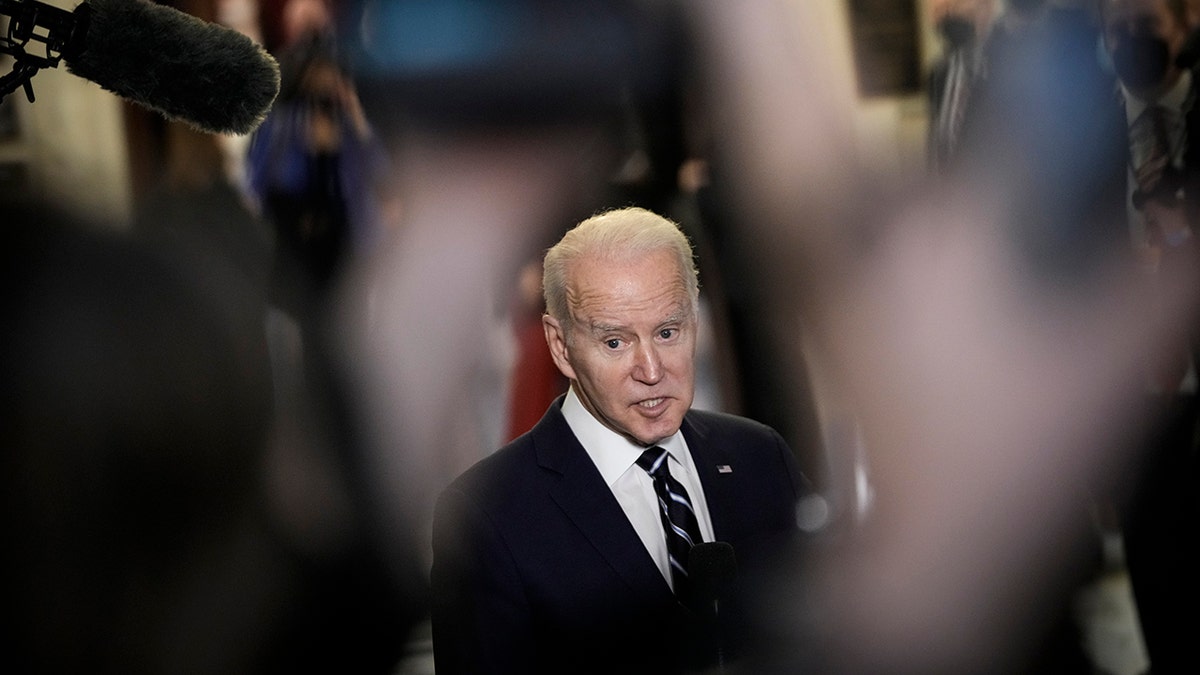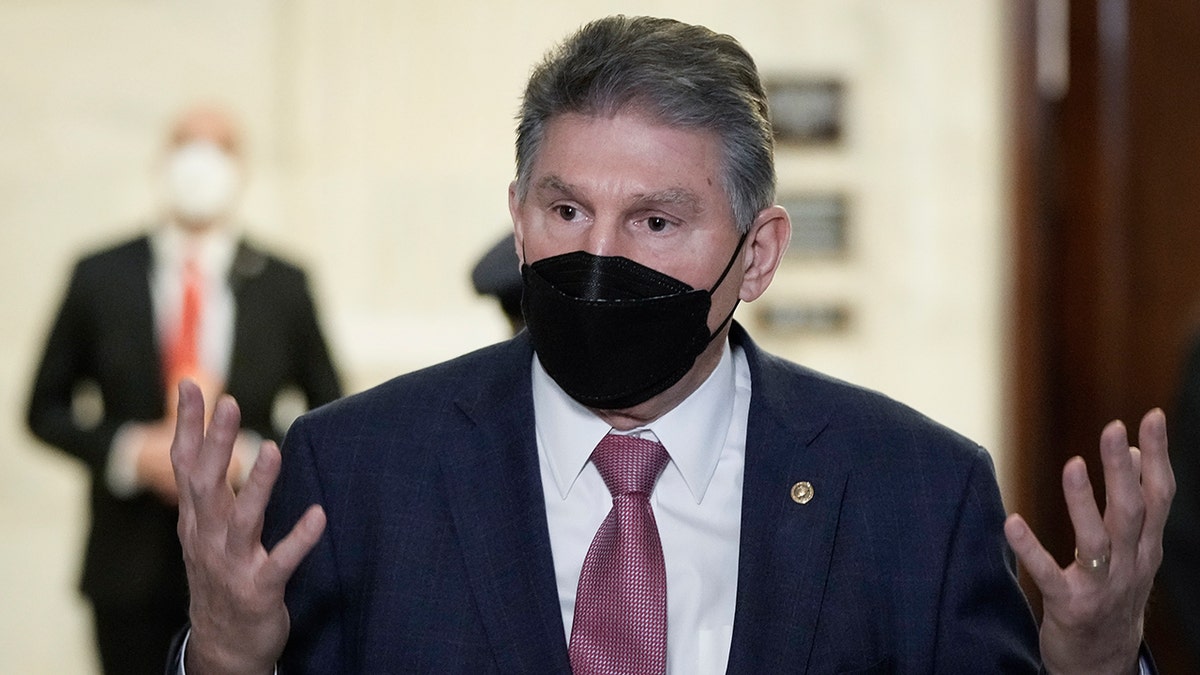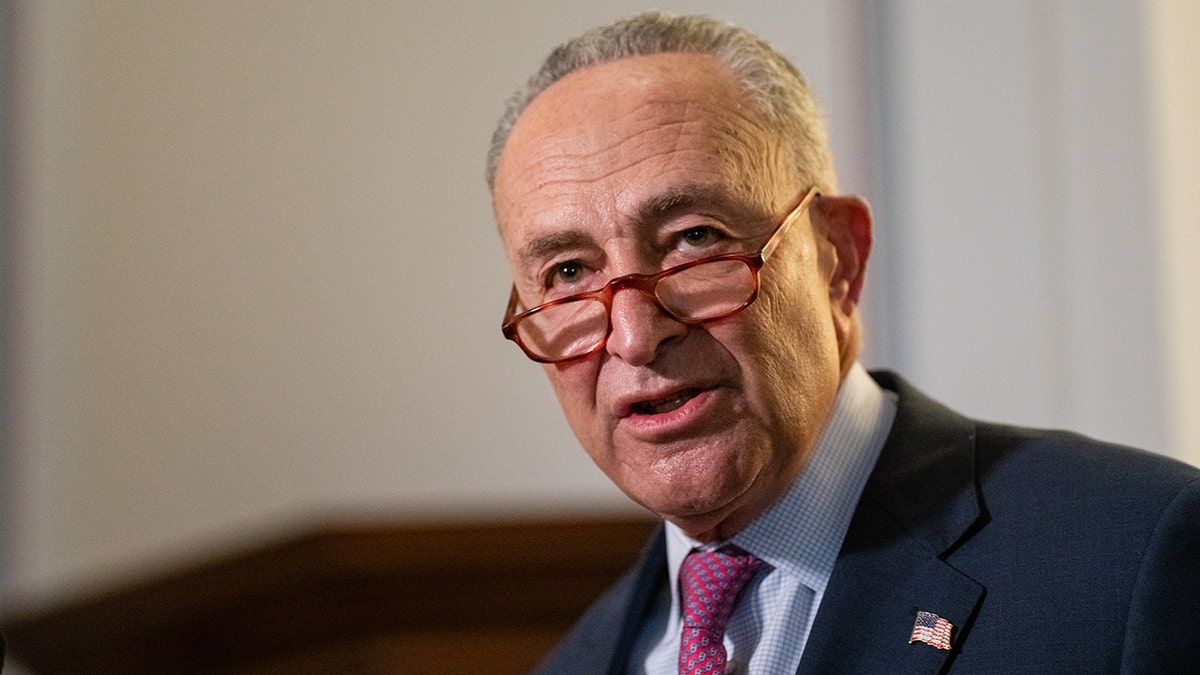Fox News Flash top headlines for January 18
Fox News Flash top headlines are here. Check out what's clicking on Foxnews.com.
President Biden doesn’t have a great deal in common with Rollie Fingers, Goose Gossage, Mariana Rivera or Dan Quisenberry.
Biden is not a closer.
The president paid Senate Democrats a visit during a luncheon late last week to pitch a repackaged voting rights bill and implore them to alter the filibuster. If Democrats don’t retool the filibuster, they can’t pass the voting rights measure.
HANNITY: EVEN THE MEDIA CAN’T PROTECT BIDEN NOW, NOBODY LIKES THE PRESIDENT

President Biden speaks to reporters after a meeting with Senate Democrats in the Russell Senate Office Building on Capitol Hill on Jan. 13, 2022, in Washington. (Drew Angerer/Getty Images)
But again, Biden couldn’t close the deal.
In other words, Democrats suffer from the same problem that seemingly vexes all 30 Major League Baseball teams: questions about their bullpen and closer.
Thursday was the latest entry in what’s emerged as a trend for the president. He visits Capitol Hill to try to pry loose the votes of Democratic members. Biden then leaves the Capitol empty-handed.
The president paid two visits to House Democrats in the fall, trying to coax them to approve both the infrastructure bill and Build Back Better measure. But Biden walked out without immediate results following both of those encounters.
That said, the House eventually approved BOTH the infrastructure and Build Back Better plans. But passage came weeks after Biden's personal appeals. The social spending bill is still mired in the Senate.
"I hope we can get this done," said the president after the Democratic Caucus meeting. "The honest-to-God answer is, I don’t know."
Another whiff for the president as his old nemeses on Build Back Better stood in the way again on the filibuster: Sens. Joe Manchin, D-W.Va., and Kyrsten Sinema, D-Ariz.
"While I continue to support these bills, I will not support separate actions that worsen the underlying disease of division infecting our country," said Sinema.
Sinema’s opposition drew the ire of Rep. Ruben Gallego, D-Ariz. He could challenge Sinema in the upcoming Senate Democratic primary.
"We won’t shrink from protecting our democracy and the voting rights of all Americans. It’s past time for the U.S. Senate, and Sen. Sinema, to do the same," said Gallego.
Republicans embraced Sinema’s opposition – even as those on her side of the aisle launched a fusillade of attacks.
"Hats off to Sen. Sinema. She kept the Senate intact, at least for a while," said Sen. Lindsey Graham, R-S.C.. "She deserves a lot of credit. So does Manchin."
But Sinema defended the Senate filibuster custom.
"The Senate’s 60-vote threshold has proved maddening to members of both political parties in recent years," said Sinema. "To save the country from radical policies, depending on whether you serve in the majority or the minority."
Sinema’s worried about the future of the filibuster when control of the body flips back and forth between parties. Moreover, Sinema and Manchin think that both sides should have a stake in altering the filibuster – not one.
"Those are the points I have been making for an awful long time," said Manchin. "We need changes to make the Senate work better. Not (by) getting rid of the filibuster."

Sen. Joe Manchin, D-W.Va., speaks to reporters after a meeting with President Biden and Senate Democrats in the Russell Senate Office Building on Capitol Hill on Jan. 13, 2022, in Washington. (Drew Angerer/Getty Images)
So Sinema and Manchin again stymied everything. But their dichotomous opposition to the filibuster puzzled some liberal activists. Both favored approval of the voting rights bills – but demonstrated opposition to unwinding the filibuster.
"I don’t know how you can support the bills without stating a pathway for that to happen," said Martin Luther King III, the oldest of Dr. Martin Luther King Jr.’s living children.
So, the left dialed up the heat on Biden and congressional Democrats – especially since any action on Build Back Better is dormant. The White House scrambled to cool the political embers.
"An agenda doesn’t wrap up in one year. We are going to continue to fight for every component of this agenda," said White House spokeswoman Jen Psaki. "We could certainly propose legislation to see if people support bunny rabbits and ice cream. But that wouldn’t be very rewarding to the American people."
It’s unclear if Psaki was speaking specifically about Blue Bunny Ice Cream.
Democrats are concerned about alienating their voters.
House Majority Whip Jim Clyburn, D-S.C., said members of the Congressional Black Caucus initially supported just the John Lewis voting rights bill. But they expanded their support to the Freedom to Vote measure after Manchin threw his support behind that plan.
"We find some real issues trying to figure out why it is that when we decided to support his bill, he seems to be supporting a filibuster of his own bill," said Clyburn. "That, to us, is very disconcerting."
It may have been just for symbolism, but Senate Majority Leader Chuck Schumer was intent on trying to get the Senate to vote on voting rights and maybe the filibuster – even if unsuccessful on both fronts – over the Martin Luther King Jr. Day weekend. Such a scenario, connected to MLK Day, was good optics – even if it was doomed to fail.
But the political storm Democrats faced crashed into a meteorological storm – to say nothing of an omicron storm.
A bad winter storm threatened Washington, D.C., over the weekend. Senate Minority Leader Mitch McConnell, R-Ky., began one meeting with his members by reading the weather forecast. He suggested that if senators left Washington, they may not be able to return. Democrats faced the same issues with the weather.
But COVID-19 raised its head.
Sen. Brian Schatz, D-Hawaii, tested positive for COVID and wouldn’t be available right away to vote. So even if Democrats had the votes in place to cast ballots on the voting rights bill and/or change the filibuster, they couldn’t have done so immediately. There’s no remote voting in the Senate.
So Democrats reluctantly punted.
"Make no mistake, the United States Senate will for the first time, debate voting rights legislation beginning on Tuesday," said Schumer, D-N.Y.

Senate Majority Leader Chuck Schumer, a Democrat from New York, speaks to members of the media at the Russell Senate Office Building in Washington, on Thursday, Jan. 13, 2022. ( Eric Lee/Bloomberg via Getty Images)
But such delays seemingly only exasperated the left even more.
In politics, it’s good to under-promise and over-deliver. However, Democrats have done the opposite. Still, they must try again on voting rights and the filibuster.
"I don't think it's a question of overpromising. I think this is a basic question. The Democrats are going to have to demonstrate to their voters that they have made every effort possible," said John Lawrence, who teaches at Georgetown and served as chief of staff to House Speaker Nancy Pelosi, D-Calif.
And so, that’s what we have this week in the Senate: Senate Democrats showing their base they "made every effort possible."
CLICK HERE TO GET THE FOX NEWS APP
But Biden couldn’t close the deal.
And, like most Major League Baseball teams, Democrats find themselves in search of a reliable closer.














































